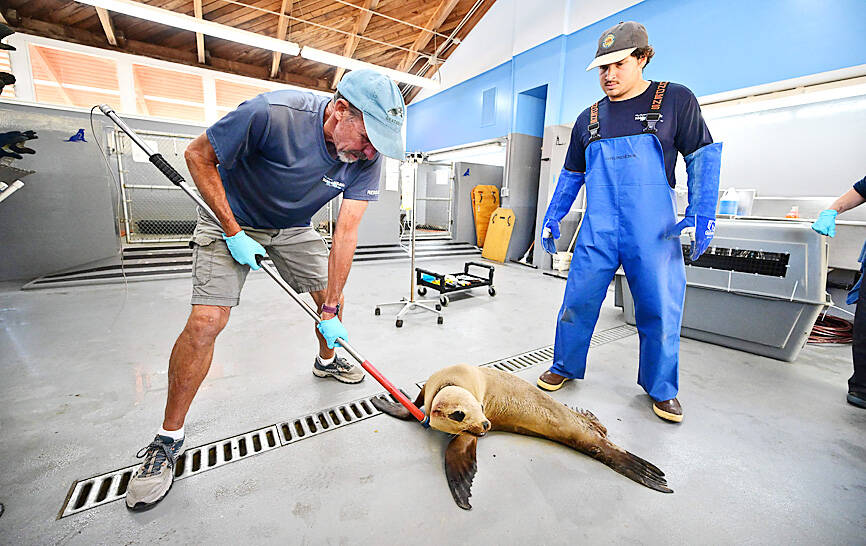Denise Christ regularly comes across injured wildlife in her work rescuing beached or stranded marine mammals along the California coast, but she has been shocked by the hundreds of sea lions and dolphins found on the shore in recent weeks, dead or dying from neurotoxin poisoning.
“Heartbreaking, to say the least,” said Christ, the Ventura County stranding coordinator for the Channel Islands Marine and Wildlife Institute (CIMWI).
The animals were sickened by domoic acid, a neurotoxin produced by algae that are a food source for fish, which are then eaten by sea lions and dolphins.

Photo: AFP
Algal blooms are not unusual this time of year, but this summer’s crisis follows another one less than a year ago, alarming and overwhelming the CIMWI team based about 190km north of Los Angeles.
“We had a pretty intense bloom last summer, but this year is way worse than we’ve ever seen in the 35 years I’ve been practicing marine mammal medicine,” CIMWI executive director and cofounder Sam Dover said.
“We had over 300 sea lions up on the beach, and over 150 dolphins that also were affected by it. It was just so sad,” said Ken Hughes, CIMWI’s stranding coordinator for Santa Barbara.
There is no official explanation for the outbreak, but experts have several theories.
Algal blooms are fed by agricultural runoff, and this year California experienced heavier than normal rainfall.
“So there’s a lot more runoff from the whole state, not just from the local regions,” Dover said.
Others from the institute said that warming oceans due to climate change were spurring algae growth.
“I believe it is the new reality and things are changing. The ocean’s changing,” Christ said.
When sea lions consume the toxin, they suffer neurological effects that include disorientation, foaming at the mouth, head bobbing and seizures.
“They basically don’t know they’re a sea lion. They don’t know where they’re at or what they’re doing,” Hughes said.
The animals then head for the shore, where they wander erratically, attracting the attention of beachgoers.
Dover said last year’s domoic acid outbreak took place in mid-August, but this year his group started getting calls reporting stricken animals in late May.
“We started getting one animal a day. So we knew it was coming, and then on June 8, literally the floodgates opened and animals just started showing up everywhere,” he said. “This is definitely the worst we’ve ever seen.”
CIMWI rescued about 300 animals last year — this year they were getting more than 300 calls each day.
Another unusual feature of this year’s outbreak is dolphins getting sick and dying from the toxin, with Dover counting more than 110 of the mammals dead over the past few weeks.
There is no cure for domoic acid poisoning, so the only way to treat the animals is with fluids, food, anti-seizure medicine and patience, experts said.
Younger animals have a better chance of survival because they eat less fish than adults, and therefore consume less of the toxin.
“Those are the ones we’re putting most of our efforts toward now and we’re having some pretty good success in flushing out the toxin from their system,” Dover said, as volunteers hosed down spacious enclosures where the rescued sea lions eat fish, float in pools and nap.
Treating, housing and feeding the sick animals demands a lot of resources, and CIMWI stays afloat through a combination of government grants, donations and volunteer labor.
“Essentially, every day is a battle with the animals and with our finances,” Dover said.

LANDMARK CASE: ‘Every night we were dragged to US soldiers and sexually abused. Every week we were forced to undergo venereal disease tests,’ a victim said More than 100 South Korean women who were forced to work as prostitutes for US soldiers stationed in the country have filed a landmark lawsuit accusing Washington of abuse, their lawyers said yesterday. Historians and activists say tens of thousands of South Korean women worked for state-sanctioned brothels from the 1950s to 1980s, serving US troops stationed in country to protect the South from North Korea. In 2022, South Korea’s top court ruled that the government had illegally “established, managed and operated” such brothels for the US military, ordering it to pay about 120 plaintiffs compensation. Last week, 117 victims

China on Monday announced its first ever sanctions against an individual Japanese lawmaker, targeting China-born Hei Seki for “spreading fallacies” on issues such as Taiwan, Hong Kong and disputed islands, prompting a protest from Tokyo. Beijing has an ongoing spat with Tokyo over islands in the East China Sea claimed by both countries, and considers foreign criticism on sensitive political topics to be acts of interference. Seki, a naturalised Japanese citizen, “spread false information, colluded with Japanese anti-China forces, and wantonly attacked and smeared China”, foreign ministry spokesman Lin Jian told reporters on Monday. “For his own selfish interests, (Seki)

Argentine President Javier Milei on Sunday vowed to “accelerate” his libertarian reforms after a crushing defeat in Buenos Aires provincial elections. The 54-year-old economist has slashed public spending, dismissed tens of thousands of public employees and led a major deregulation drive since taking office in December 2023. He acknowledged his party’s “clear defeat” by the center-left Peronist movement in the elections to the legislature of Buenos Aires province, the country’s economic powerhouse. A deflated-sounding Milei admitted to unspecified “mistakes” which he vowed to “correct,” but said he would not be swayed “one millimeter” from his reform agenda. “We will deepen and accelerate it,” he

Japan yesterday heralded the coming-of-age of Japanese Prince Hisahito with an elaborate ceremony at the Imperial Palace, where a succession crisis is brewing. The nephew of Japanese Emperor Naruhito, Hisahito received a black silk-and-lacquer crown at the ceremony, which marks the beginning of his royal adult life. “Thank you very much for bestowing the crown today at the coming-of-age ceremony,” Hisahito said. “I will fulfill my duties, being aware of my responsibilities as an adult member of the imperial family.” Although the emperor has a daughter — Princess Aiko — the 23-year-old has been sidelined by the royal family’s male-only